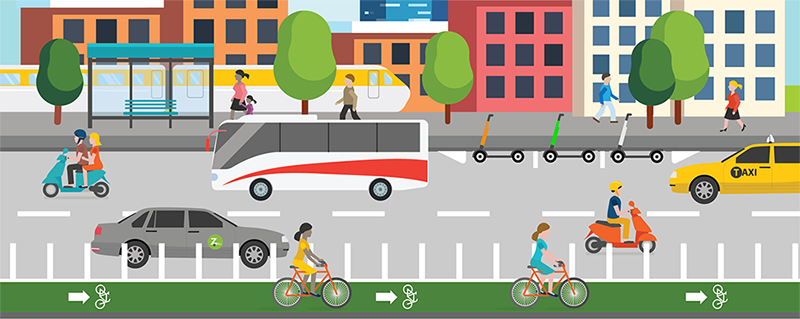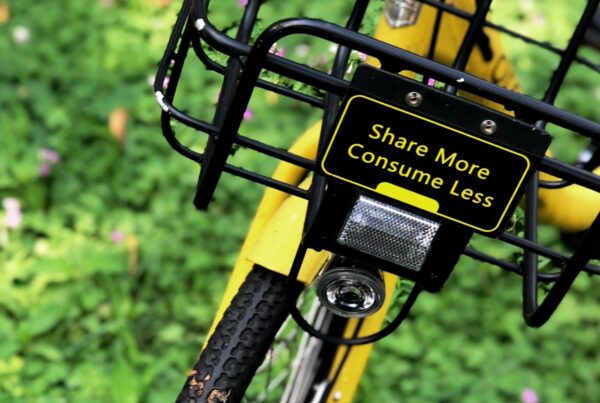Welcome to the Shared-Use Mobility Center’s weekly guide to the most impactful news, thought-provoking articles and innovative technologies that are shaping our transportation future. We believe in sharing information, just like sharing cars, bikes, and scooters, so if there’s anything additional you’d like to see, just drop us a line.
SUMC News and Announcements
SUMC In the News
Updated Metro Profiles for 2021
The Metro Profiles on our MOD Learning Center are given a refresh twice a year to reflect changes in shared mobility across the nation’s 25 most populated metropolitan areas. Scooter share, bikeshare, and carshare are covered along with demographics, commuter trends, stats per provider and more. When we completed our recent update in December 2020, we saw central themes among these transportation services in areas across the country.
Albert Benedict, SUMC’s Director of the Learning Center & Accessibility Programs has written a timely overview of what happened and why it matters. People in all areas can benefit from learning how these services have entered and fared in each market, what challenges have arisen during operations and how the services adapted, and seeing overall usage statistics.
Read Updated Metro Profiles: Central Themes Among Multimodal Transportation Services
Access the Metro Profiles on the Learning Center
Events of Note:
Smart Growth America’s Equity Summit
Three-day virtual summit focuses on promoting equity in housing and land use, with an eye to revitalizing neighborhoods and righting past wrongs. January 26th – 28th from 12 PM – 2 PM CT.
Electrified Community Carsharing
Forth Mobility will highlight the progress of the Clean Rural Shared Electric Mobility (CRuSE) project in Hood River, OR, which seeks to bring all-electric carsharing to rural communities. January 26 from 12:00 PM – 1:00 PM CT.
Mobility Justice
The opposition to shared, open-street programs in cities has a point to make that city planners need to heed: without local community engagement and involvement in the implementation process, programs are not equitable or tailored for the people they aim to serve.
Accessing transit should not become a chore that involves delays, unreliable service, crumbling infrastructure, or long treks to the closest bus or train stop. Disenfranchised communities deserve the same quality of transit as richer, whiter, and affluent areas in all cities, including New York.
CDOT has a new strategic plan, and it mentions “mobility justice.” A giant step forward in itself, but one that must be backed up with community engagement and increased representation of Black and Brown residents, women, people with disabilities and other marginalized groups from the start.
With environmental justice at its core, Massachusetts, Rhode Island, Connecticut, and DC hope to modernize transportation and cut emissions in the Eastern region to address the effects of climate change on historically marginalized Black, Brown and low-income communities.
Ridehailing/Carsharing/Carpooling
Do more people own cars since the advent of ridehailing? Research out of Carnegie Mellon University believes so after studying car ownership trends in 224 urban areas from 2011 to 2017 and finding an average increase of 0.7% in mostly car-dependent cities with faster population growth.
Kyte, a two-year-old startup that wants to bring car rentals right to your doorstep, has raised $9 million for its platform that uses car rental companies to supply vehicles and gig-economy workers to deliver them to those who want an alternative to car ownership.
Uber trip prices are rising by 25% in Seattle, a move that comes after the city passed legislation to raise minimum wages for ridehail drivers as part of Mayor Jenny Durkan’s “Fare Share” program, which also imposed a tax on Lyft rides.
Seed Initiative, a new program from carsharing platform Turo, will provide interest-free loans through financing company Kiva, to fund Black entrepreneurs starting car rental businesses through Turo in 14 US cities.
Bikesharing and Micromobility
The rise of micromobility in the US supports sustainable transportation while creating safer, calmer streets that reduce pollution and traffic incidents. But if we plan to have more two or three-wheeled devices zipping in our neighborhoods, we need to figure out where to park them now.
Cobb County, GA has a new bikeshare pilot program, courtesy of Tandem Mobility, that includes 80 bikes at 12 stations in the Cumberland and Town Center community improvement districts—making the fundamental task of getting around that much easier (and healthier.)
35 miles, 75 neighborhoods, and immeasurable social, economic, and public health benefits. That’s what greenway advocates and planners expect for the Baltimore region from a new proposal to build out the Baltimore Greenways Trail Network.
If you want a healthier city, you need more people walking, rolling, or pedaling on two (or three) wheels and to create spaces where amenities are a 15-minute or less stroll away, says Fast Company in this look at how cities can plan for resilience and public health.
Transit
The Fair Transit South Cook program, which gives Metra and Pace riders reduced fares in Chicago’s South and West Sides, is now underway to address affordability and equity issues along the Metra Electric and Rock Island Lines for people with limited transportation options.
The University of Minnesota and the Minnesota Department of Transportation are testing a program, called Flexpass, that bundles transit and parking passes as an option for commuters to help offset solo-car trips and reduce congestion and pollution.
Mass Transit Magazine breaks down five must-watch transit trends that are expected to define the transportation industry in 2021 and beyond. Check them out!
Read The Urbanist’s analysis of King County Metro’s plan to electrify its bus fleets and how the cost and implementation of the project could unearth negative consequences for transit service and the agency’s budget without additional federal funding to ease the transition.
Technology
Smart Cities Dive lists seven mobility startups to keep on your radar for 2021 that have their sights set on fixing present—and future—mobility challenges worldwide.
The use of contactless, human-free deliveries carried out by autonomous robots is gaining traction in Japan, with notable pilots coming from the country’s mail agency Japan Post, which is deploying delivery bots on city streets alongside large companies like Panasonic and Rakuten.
Volkswagen’s latest prototype is an autonomous electric vehicle charger that can juice up EVs around parking areas without any human intervention and via a dedicated app.
Delivery sans human is here. Self-driving vehicle delivery startup Nuro has received a permit to operate fee-based, autonomous delivery in nine cities within Santa Clara and San Mateo counties in California.
Sustainability
“If you want to complain about losing a few parking spots on your block, I’m sorry for your inconvenience but our entire city benefits when you give streets back to people,” states Danny Harris, the Executive Director of Transportation Alternatives in The New York Time’s latest feature on parking and space in the city.
Congrats to Norway for becoming the first nation in the world where EV sales have outpaced vehicles powered by gas or diesel with a whopping 54.3% of all new cars sold being electric. Let’s keep the momentum going for electric mobility growth!
This past year has shown us how we can promote healthy and sustainable living, while expanding public health resources, by reclaiming our local streets from cars. Going forward we need to engage all communities in the planning process and push cities to keep select streets closed so that everyone benefits in the long term.
Commuting patterns have changed for the foreseeable future, and remote working has set an interesting precedent for those who used to spend hours a day driving or taking transit to work. Will life under the pandemic remove the need for super commuters?
Requests for Proposals, Inquiries, and Information
RFI: Electric and Hybrid Transit Buses
New York State Office of General Services
Albany, NY
Deadline: January 21, 2021
Open Call: Climate Smart Cities Challenge
Nesta
London, GB
Deadline: January 22, 2021
RFP: Complete Streets Concept
Mid-America Regional Council
Westwood, KS
Deadline: January 29, 2021
Complete Streets Study
Mid-America Regional Council
Merriam, KS
Deadline: January 29, 2021
RFP: Paratransit Management Services
Pioneer Valley Transit Authority
Springfield, MA
Deadline: February 5, 2021
Did someone forward this to you? Sign up for our newsletter here.



